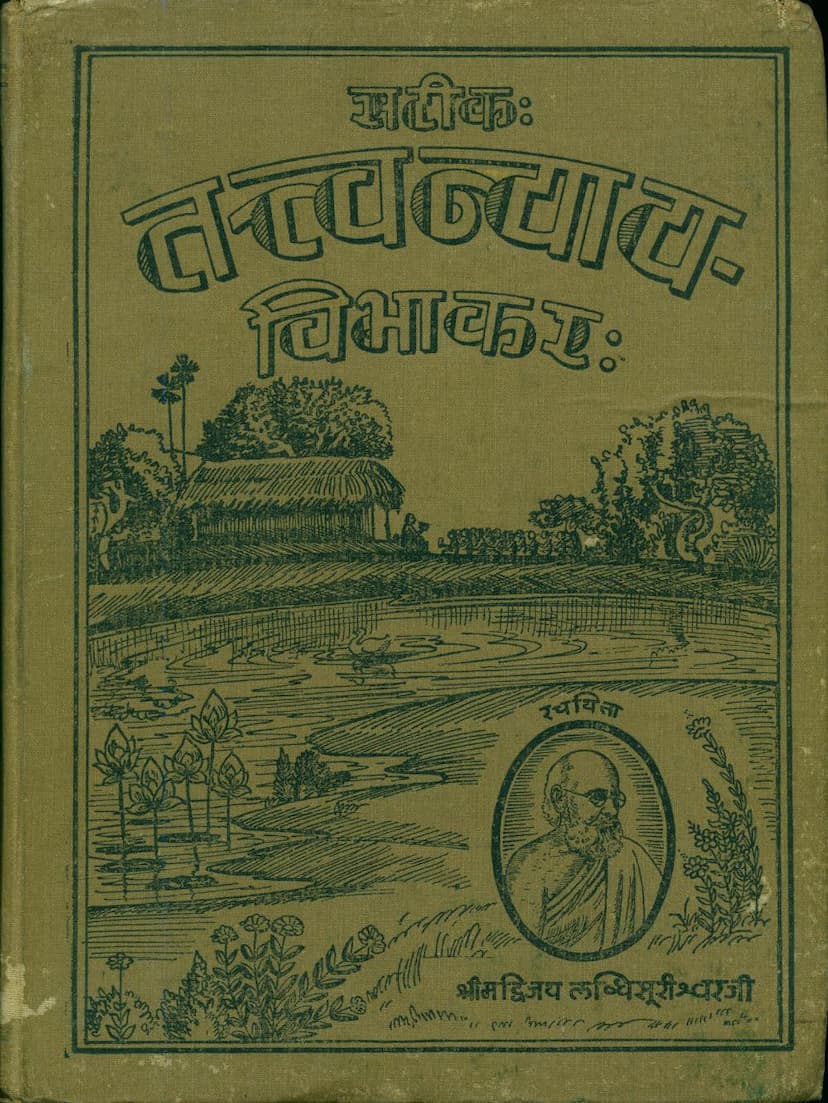Tattva Nyaya Vibhakar
Added to library: September 2, 2025

Summary
This comprehensive summary details the Jain text "Tattva Nyaya Vibhakar" by Labdhisuri, published by Labdhisuri Jain Granthmala. The book, a commentary on Jain principles and logic, is presented with its detailed table of contents, spanning eleven "Kirans" (chapters). Each Kiran delves into specific aspects of Jain philosophy, ontology, epistemology, and ethics, with a particular focus on logical reasoning and the substantiation of Jain doctrines.
Key aspects covered:
- Author and Publisher: The text is authored by Acharya Shrimad Vijay Labdhisurishwarji and published by the Shrilabdhisurishwar Jain Granthmala.
- Structure: The book is divided into eleven Kirans, each covering distinct philosophical and logical topics. The table of contents provides a detailed outline of the subjects discussed within each Kiran.
- Content Overview (based on the table of contents):
- Introduction and Monogala (Blessings): The initial pages cover auspicious beginnings, acknowledgments, and an introduction to Jain philosophy, emphasizing the importance of right faith (Samyak Shraddha).
- Core Jain Principles: The text systematically explores fundamental Jain concepts, including:
- Tattvas (Realities): Detailed discussion of Jiva (soul) and Ajiva (non-soul) and their constituent categories like Dharma, Adharma, Akash, Kaal, and Pudgala.
- Karma Theory: Elaborates on the influx of karma (Ashrav), the stoppage of karma (Samvar), the shedding of karma (Nirjara), and the bond of karma (Bandh).
- Moksha (Liberation): The ultimate goal of Jainism, liberation from the cycle of birth and death, is discussed in detail.
- Punya and Paap (Merit and Demerit): The concepts of merit and demerit, which influence karmic bondage, are explained.
- The Soul (Jiva): Extensive exploration of the soul's nature, its attributes, transmigration, and its relationship with karmic matter.
- Epistemology (Praman): Discussion on valid means of knowledge, particularly perception (Pratyaksha) and inference (Anumana), with a detailed analysis of their categories and sub-categories.
- Logic and Syadvada (Anekantavada): The text emphasizes the Jain principle of manifold perspectives (Anekantavada) and the doctrine of conditional predication (Syadvada) as crucial for understanding reality, refuting contradictory arguments.
- Ethical Conduct (Achara): Outlines the path to liberation through Right Faith, Right Knowledge, and Right Conduct (Ratnatraya), detailing various vows (Anuvrata, Mahavrata), conduct rules for monks and nuns, and the importance of austerities (Tapas).
- Six Substances (Dravya): Explains the fundamental Jain substances and their properties.
- Ontology: Discusses the classification and nature of various categories like karma, bondage, liberation, time, space, etc.
- Commentary: The book includes "Svopagya Nyaya Prakash," a self-commentary by the author, which elucidates the original text.
- Detailed Table of Contents: The provided text includes a remarkably detailed table of contents, listing numerous sub-topics and concepts discussed throughout the eleven Kirans. This includes specific types of karma, psychological states, the nature of perception, logical fallacies (Hetvabhasas), and the classification of souls.
Overall Significance:
"Tattva Nyaya Vibhakar" appears to be a rigorous and comprehensive work within the Jain tradition, aiming to systematically explain and logically defend Jain philosophical tenets. The author, Labdhisuri, is presented as a prominent figure in Jain scholarship. The commentary by the author himself, along with critical notes, suggests a deep engagement with the subject matter, making the text valuable for serious students and scholars of Jainism. The publication details indicate a commitment to preserving and disseminating classical Jain literature.